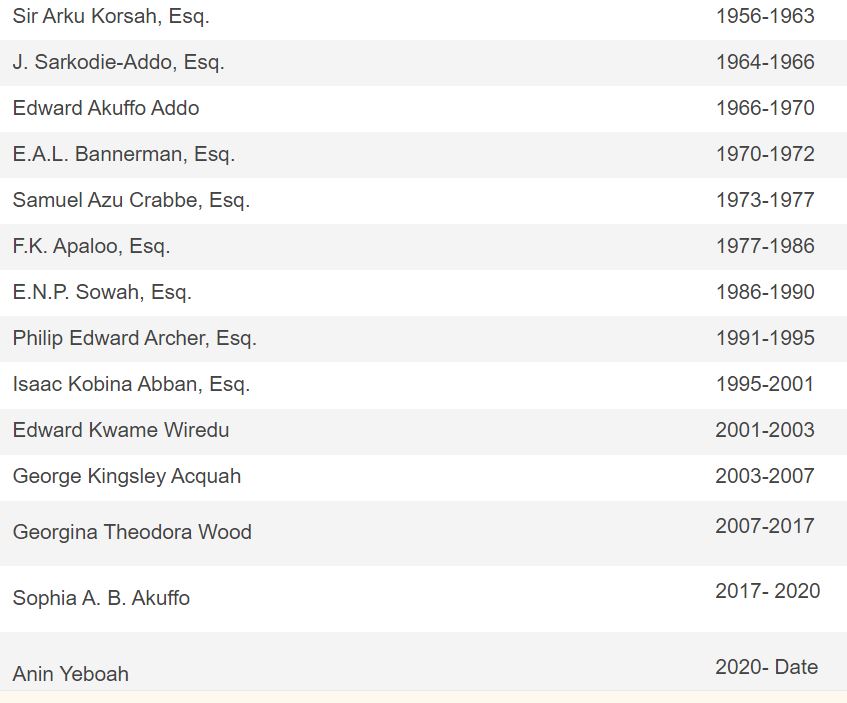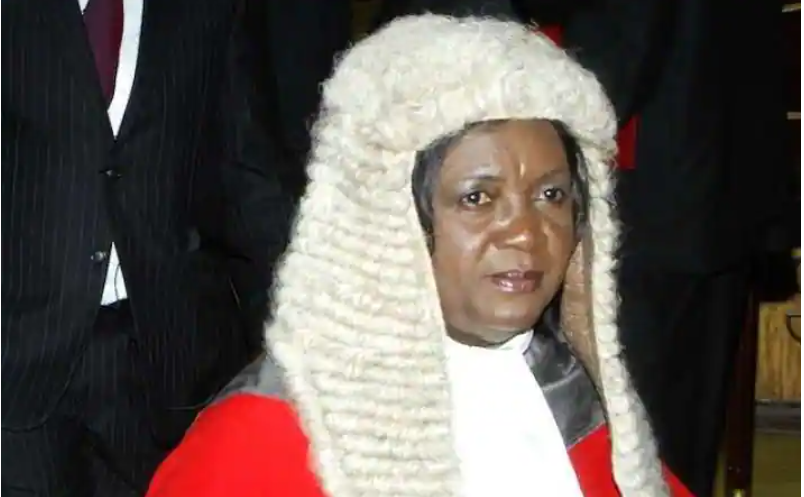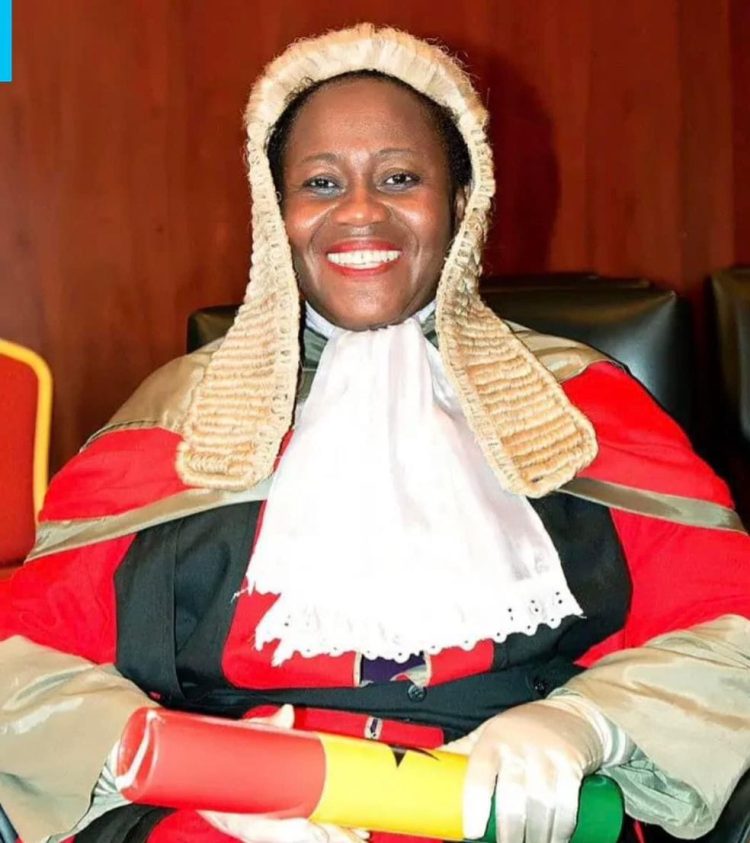Meet The Females Appointed As Chief Justices Since Ghana’s Independence
The Chief Justice is the senior-most officer in the judiciary and the fourth highest officer in Ghana.
In the absence of the President, Vice-President and the Speaker of Parliament, the Chief Justice becomes the country’s leader.
The individual is tasked with numerous responsibilities, notably presiding over Supreme Court proceedings.
Since attaining independence, Ghana has been blessed with many legal brains in good moral standing who have served as Chief Justice.
The likes of Sir Arku Korsah, Esq (1956-1963), Julius Sarkodie-Addo, Esq (1964-1966), Edward Akuffo Addo (1966-1970) and fast forward to the current Chief Justice Anin Yeboah, have dedicated their lives to promoting a strong judiciary.
Interestingly, since independence, only two females out of 14 have been appointed to the highest office, underpinning the skewed selection of the judicial head.

In modern times, gender equality and diversity have played a key role, with all females appointed under the Fourth Republic of Ghana.
With the nomination of Justice Gertrude Torkornoo as the next Chief Justice by President Nana Akufo-Addo, the judicial desk of The Ghana Report takes a look at the deserving females who have been elevated to the office since Ghana’s independence in 1957.
Georgina Theodora Wood (2007-2017)

After witnessing the reign of 11 male Chief Justices, her Ladyship Georgina Theodora Wood broke the glass ceiling with her appointment as the first female CJ in May 2007.
This followed the death of Chief Justice George Kingsley Acquah.
She was sworn into office by then-President John Agyekum Kufuor in June 2007 and became the 13th Chief Justice of Ghana.
Georgina Wood had worked in the judicial service for 35 years. She received a Bachelor of Law (LLB) from the University of Ghana in 1970 and a barrister-at-law (BL) certification in 1972 from the Ghana School of Law.
She received training from the Ghana Police Service, allowing her to work as a deputy superintendent of police. After being called to the Ghana Bar and serving as a police prosecutor, she joined the judicial service as a magistrate in 1974.
From this position, she rose through the ranks of the lower courts. She served on the Supreme Court of the Gambia between 2003 and 2007. In 2002, President Kufuor nominated her as a candidate for Chief Justice, but she declined for reasons not openly stated.
In 2007, when he again nominated her, she accepted the nomination and received an overwhelmingly positive confirmation by the 26-member vetting committee in the Parliament of Ghana.
She swore in four Ghanaian presidents within the 10 years she held the position.
Her tenure as Chief Justice ended when she retired in June 2017, creating room for retired Chief Justice Sophia Akuffo.
Sophia Abena Boafa Akuffo (2017- 2020)

The baton was passed to retired Chief Justice Sophia Akuffo on May 11, 2017.
Her long service in the judiciary largely influenced her appointment as the CJ. Before her appointment, she served as Supreme Court judge for 22 years (from 1995 to 2017).
She was sworn in as the 13th Chief Justice of Ghana by President Akuffo Addo on June 19, 2017. She held the position until 2020, when she paved the way for the current CJ Anin Yeboah.
The vivacious Sophia obtained her Bachelor of Law (LLB) from the University of Ghana and a Masters from Harvard University in the USA. She trained as a lawyer under President Akufo-Addo.
Prior to her appointment as CJ, she worked in private practice and was appointed by the late former President Jerry John Rawlings to the Supreme Court in November 1995. She has been a member of the Governing Committee of the Commonwealth Judicial Education Institute and the Chairperson of the Alternative Dispute Resolution Task Force for several years.
In January 2006, she was elected as one of the first judges of the African Court on Human and Peoples’ Rights: she was initially elected for two years and subsequently re-elected until 2014 and served as Vice-President and President of the Court, respectively.
Akuffo wrote The Application of Information & Communication Technology in the Judicial Process – the Ghanaian Experience, a presentation to the African Judicial Network Ghana (2002).
Probably, her most celebrated dissent is her classic opinion in ‘Parliamentary Election for Wulensi Constituency; Zakaria versus Nyimakan’. In this case, the issue before the Supreme Court was whether it had jurisdiction to hear an appeal from the decision of the Court of Appeal on the challenge to the election of a Member of Parliament.
Retired Justice Sophia Akuffo held that the Supreme Court had jurisdiction to hear the appeal. In her characteristic succinct opinion, Justice Akuffo drew parallels between various provisions in the Constitution and held that where the framers intended the Court of Appeal to have the final say on an issue, the Constitution expressly said so. So, in the absence of a finality clause under Article 99, the Supreme Court’s general jurisdiction to hear civil appeals from decisions of the Court of Appeal applies to a challenge to the election of a Member of Parliament.
Her reputation as a great jurist is indisputable.
Gertrude Torkonoo

Justice Gertrude Torkornoo will become Ghana’s third female and 15th Chief Justice if Parliament approves her nomination.
Justice Torkornoo is the supervising judge for the Commercial Courts of Ghana and holds an LLM in Intellectual Property Law from Golden Gate University, San Francisco, and a Postgraduate Diploma (PGD) in International Law and Organizations for Development from the Institute of Social Studies, (now part of Erasmus University) in The Hague.
She serves on the board of the Judicial Training Institute and as a faculty member in Judicial Ethics, Case Management, Courtroom Communication, and Commercial Law.
After law school in 1986, Justice Torkornoo did her national service with the International Federation of Women Lawyers (FIDA) Legal Aid Center in Accra. Her pupillage was with Fugar & Co, where she became an Associate and, later, a director of the firm.
In 1989, while an Associate at Fugar & Co, she won an International Bar Association scholarship in Construction Law. This led to her doing a stage with Nabarro Nathanson in London and specialising in Construction Law. In January 1997, she set up Sozo Law Consult and became the Managing Partner.
After 18 years of law practice, Justice Torkornoo was invited to join the judiciary in 2004 as a Justice of the High Court of Ghana. In October 2012, she was promoted to the Court of Appeal and rose to become a Justice of the Supreme Court in 2019.
Justice Gertrude Torkornoo chairs and serves on several administrative committees of the Judicial Service, her favourite being the Chief Editor of The Bench, the annual magazine of the Association of Magistrates and Judges of Ghana.
She is also a Commissioner of the Law Reform Commission of Ghana. In 2015, she received the Ghana Women of Excellence Award on Judicial Integrity. She was made an honorary Fellow of the Ghana Institute of Construction in 2016 for her contributions to the construction industry.
Outside the courtroom, Justice Torkornoo is a poet and author of five books – two on poetry and three on the law.
Her writings include ‘Creating Capital from Culture’; ‘An Uneasy Marriage – the Relationship between interest rate regimes and debt recovery rates in Ghana (2012), ‘Examining the Borrowers and Lenders Act’ (2015), and ‘The Law on Interests’ (2021).
She is also fondly remembered for saying she hoped judges in Ghana would wear African robes, contrary to the strict formal heavy black robes. She made this statement in December 2019 when she appeared before the Appointments Committee of Parliament as a Court of Appeal judge.


